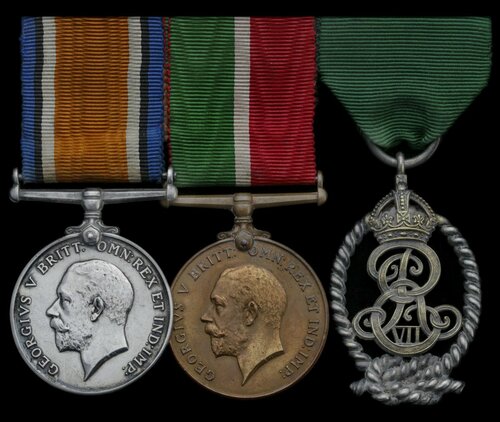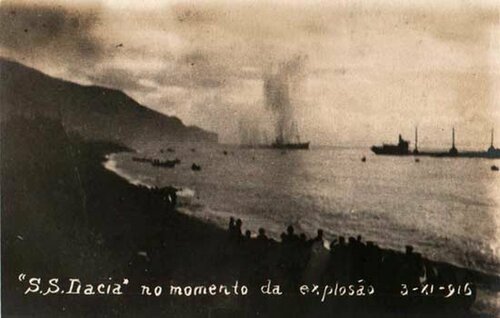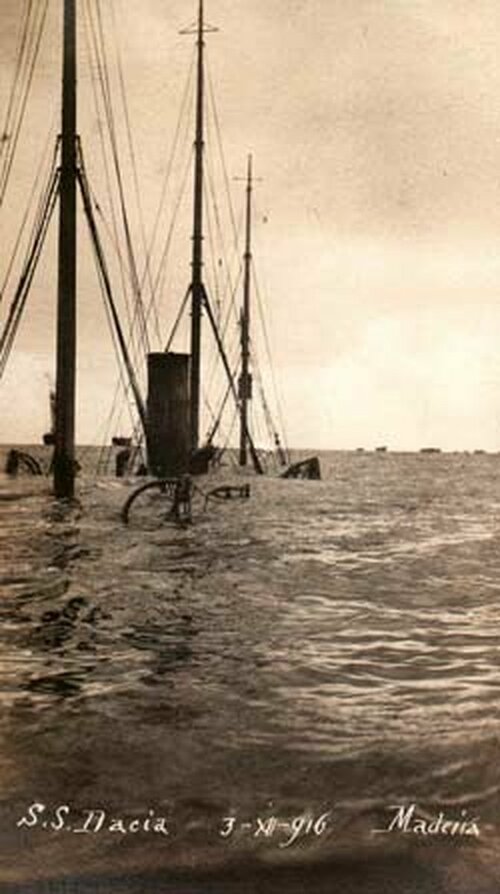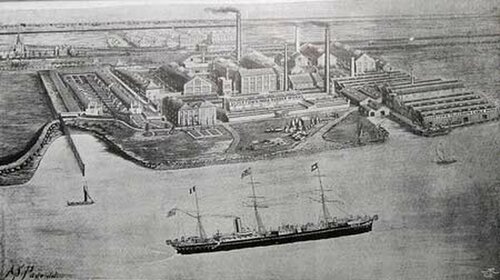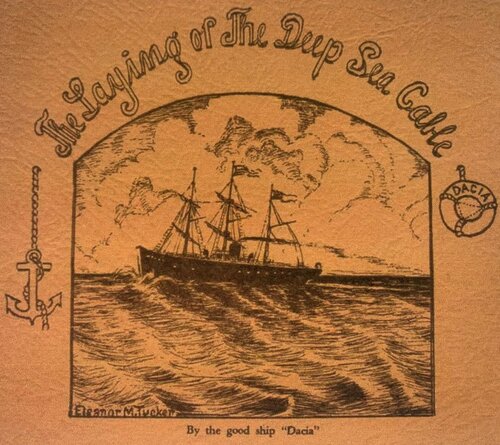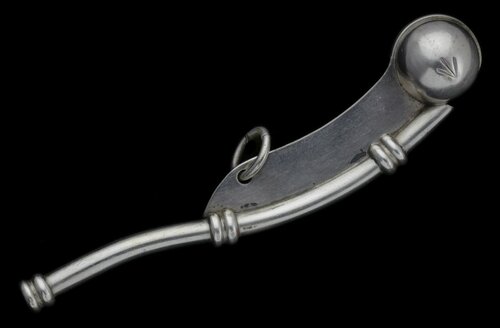Auction: 21003 - Orders, Decorations and Medals
Lot: 355
An interesting group of three awarded to Commander F. W. Robinson, Royal Naval Reserve - who had a successful career in laying submarine cables, before serving aboard the Cable Ship Dacia when she was torpedoed by Max Valentiner's U-36 in Madeira Harbour on 3 December 1916
British War and Mercantile Marine War Medals (Frederick W. Robinson); Royal Naval Reserve Decoration, E.VII.R., silver and silver-gilt, hallmarks for London 1909, mounted as worn, good very fine (3)
Frederick William Robinson was born on 25 October 1857 at Stratford, Essex and by the end of the century was commissioned in the Royal Naval Reserve and working for the India Rubber Telegraph Works at Silvertown, working with submarine cables aboard the Dacia and Buccaneer. He rose to become Engineer in Charge and laid cables to Cuba and New York during his career.
He was awarded the Royal Human Society's Testimonial for his work aboard the Silvertown at Salina Cruz, Mexico in 1893. Mr W. Bobbitt, a cable hand, was laying cables in a strong surf, when Robinson, together with five comrades, saved his life. Sadly two men were drowned (The Electrician, 10 November 1893, refers). His R.N.R. Decoration followed on 4 November 1909.
During the Great War, he was serving aboard the Dacia when she was in the process of diverting the German South American cable into Brest. Anchored in Madeira Harbour, she was torpedoed by Max Valentiner's U-36, exploding and sinking. Valentiner earned himself a Pour le Merite as the third highest scoring U-Boat ace during the Great War but was also listed as a War Criminal, for he had previously sunk the Persia on 30 December 1915.
The work of the cable ships was kept rather secret during the Great War, indeed it wasn't until 18 December 1919, that the Chairman of the company, Major Leonard Darwin, presented the following report on the operations:
'There is one other matter connected with the past history of the company to which I wish to allude. Since the war began I have on more than one occasion said that we had been doing work for the French Government, but I gave no details. Early in the War we were employed in diverting the German Emden-Teneriffe cable into St. Nazaire and in making several repairs to French Government cables - dangerous work, which ended more than two years afterwards with the sinking of our ship and the accompanying French man-of-war in Funchal Harbour, Madeira, by a German submarine.
Far the most important work accomplished by our ship, the Dacia, under the supervision of submarine cable engineers Mr. Crawford and Mr. Robinson successively, was the diversion of the rest of the German Emden-Teneriffe cable so as to connect Brest with Casablanca, in Morocco, and the diversion of the German Teneriffe-Monrovia cable so as to connect Morocco with Senegal. The Emden-Teneriffe cable was first cut off Brest, a length picked up and relaid into Brest. The same operation on a larger scale was then performed off Casablanca, with the result that, after the necessary connections had been made, this second portion of the German Emden-Teneriffe cable was converted into a French Brest-Casablanca cable. Similar work was carried out on the German Teneriffe-Monrovia cable, thus extending the French cable from Casablanca, to Dakar in Senegal. Our cable engineers, Mr. Crawford and Mr. Robinson, after fully considering the difficulties, held that these were possible operations; there were no signs. that any other English expert, whether governmental or in private employment, shared in this view; whilst the electrical advisers to the French Government declared the scheme to be impracticable owing to the depth in which the cable lay.
Imagine fishing for a cable in pitch darkness - not that any light at the bottom could have made matters easier - the cable lying about as far below the ship as is the Tower of London from Buckingham Palace; imagine trying to cut the cable in these circumstances in the hope of being able to haul up one of the two ends thus set free to the surface; imagine pulling it up vertically through these nearly three miles of water, then steaming away. whilst continuing to drag up the cable from the bottom, coiling it up on board without any kinks Or unperceived injuries; and finally relaying it exactly where required; imagine all this, and I think scepticism as to the possibility of success becomes more than excusable. If our information is correct, this remarkable performance is absolutely unique in the history of submarine cable enterprise, and this whether we look to the length of the cable lifted, 1,200 miles, or to the average depth of the water in which it lay.
Our staff without exception worked splendidly, but the chief credit for the success must be awarded to our managing director, Mr. C.H. Gray. He conceived the scheme and advised the Board to take the risks involved; he persuaded the French Government to neglect the doubts expressed by their own expert advisers; and he-inspired all hands with the energy essential for success in such a feat.
I am very glad to say that the position was fully realised by the French Government, for our Foreign Office has recently transmitted to Mr. Gray the Cross of Chevalier of the Legion of Honour, which had been awarded to him by the President of the French Republic for his services during the war. I know you will all join with me in giving him our hearty congratulations. It is only his native modesty that prevents his wearing the red button to-day.'
Robinson applied for his Medals in August 1919, with them being delivered to him at 32 Empress Avenue, Ilford; sold together with his whistle and copied research.
Subject to 20% VAT on Buyer’s Premium. For more information please view Terms and Conditions for Buyers.
Sold for
£270
Starting price
£130

